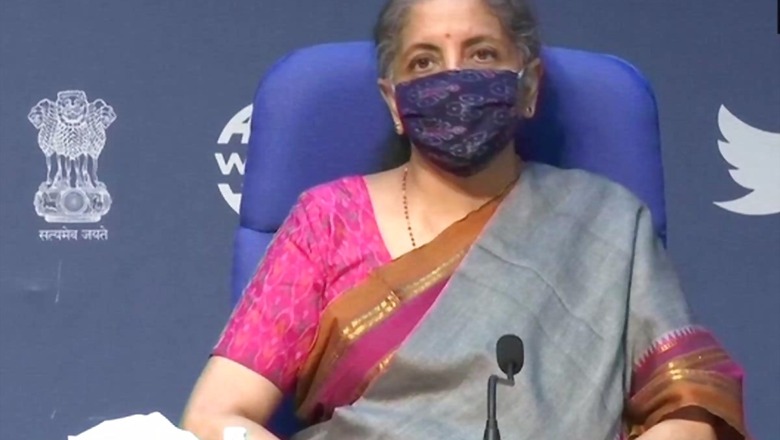
views
The second GST Council meeting in a week, held on Monday, did not end the deadlock between opposition states and Centre, with Finance Minister Nirmala Sitharaman urging the states to opt for the first borrowing option.
The Council, chaired by Sitharaman and comprising state finance ministers, for the third time in a row discussed the issue of funding the shortfall of Goods and Services Tax (GST) revenue of states. While some opposition-ruled states demanded that a Group of Ministers be set up to arrive at a decision on the mechanism for funding compensation shortfall, the BJP-ruled states, which have already opted for the borrowing option given by the Centre, are of the view that they should be given a go ahead so that they can get money quickly.
Punjab Finance Minister Manpreet Badal said it would not be right for the Centre to impose its will, asserting that the shortfall should only be made good by the Centre replenishing the Compensation Fund instead of asking states to borrow. He asked the Centre to establish a mechanism to adjudicate any dispute. Punjab has already rejected the Centre’s proposal of borrowing by states to meet shortfall in GST revenue.
The Centre repeatedly emphasised the point that 21 states and Union Territories have already accepted the first option and that as per constitutional provisions, the GST Council does not have the jurisdiction to approve the borrowing plan of states.
The two borrowing options given by the Centre to the states at an earlier GST meeting included: calculating GST related shortfall in revenue at Rs 1.10 lakh crore, which states should borrow from the RBI under a special dispensation. This borrowing will not be counted from any of the states’ existing borrowings and its entire interest and principal would be settled through compensation cess, including the levy in the extended period.
The second option gives the states’ plan to borrow the entire expected shortfall of Rs 2,35,000 crore this year and this borrowing will only be paid back to states during the extended period of GST compensation cess levy.
As states are hard-pressed for finances to meet their expenditure, some like Bihar want the issue of pending compensation dues worth over Rs 2 lakh crore to be settled at the earliest.
In the last meeting, the Council extended the GST compensation cess beyond 2022. However, on the issue of borrowing options to meet revenue shortfall, there was no consensus.
Sitharaman had said some changes to the borrowing options have already been made, based on states’ inputs to meet compensation gap shortfall. Instead of Rs 97,000 crore provided as the first borrowing option earlier, the amount now has been made Rs 1.1 lakh crore.
On repayment schedules, the minister had said interest on the borrowed amount will be the first charge on the cess which gets collected beyond 5 years and next charge could be 50 percent on the principal amount which gets borrowed.
However, due to a lack of consensus in the last meeting, it is possible that the issue could be put to vote, as the non-BJP ruled states would likely push for it. The Centre would, however, resist putting it for voting as borrowing related issues do not come within the Council’s jurisdiction.
As most states are hard-pressed to meet their expenditure requirements because of a revenue shortfall, exacerbated by the Covid-19 pandemic, in a letter to the finance minister, Bihar Deputy Chief Minister Sushil Kumar Modi had said the Centre should sort out the issue as fast as possible and let states that have already submitted their choice to borrow.
In August, the Centre had proposed two options to states, to either borrow Rs 97,000 crore (on account of GST implementation) through a special window facilitated by the RBI or to borrow the complete shortfall of Rs 2.35 lakh crore (including Rs 1.38 lakh crore due to COVID) from the market. The amounts under the two options have since been revised to Rs 1.10 lakh crore and Rs 1.8 lakh crore, respectively.
The Centre has released Rs 20,000 crore to the states towards compensation shortfall so far in the current fiscal. Under the GST structure, taxes are levied under 5, 12, 18 and 28 per cent slabs. On top of the highest tax slab, a cess is levied on luxury, sin and demerit goods, and the proceeds from the same are used to compensate states for any revenue loss.
Read all the Latest News and Breaking News here
















Comments
0 comment